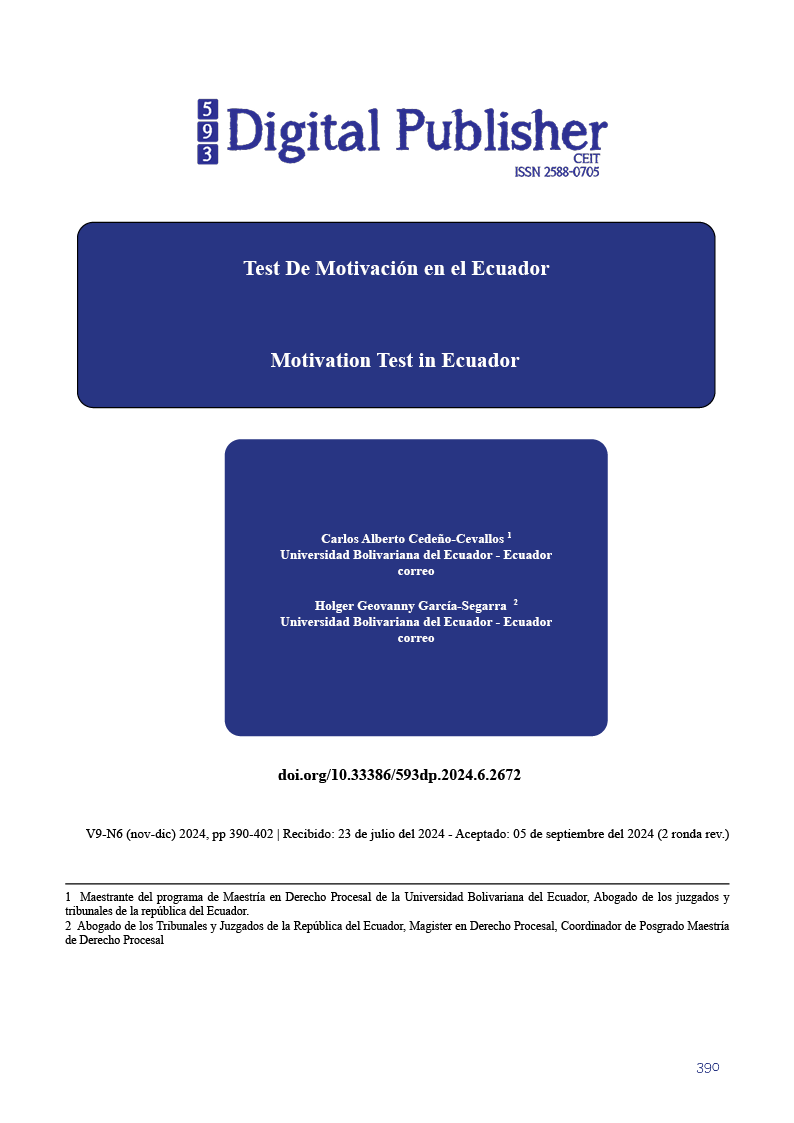Motivation Test in Ecuador
Main Article Content
Abstract
The right to the guarantee of reasoning is important because it is not only about explaining but also about justifying why the judicial authority has reached that decision by providing sufficient reasons for it. When a judge does not justify a decision, it violates the right to effective judicial protection, due process, and legal certainty. The objective of the research is to analyze the guiding criterion for evaluating a claim of violation of the right to the guarantee of reasoning, based on Judgment 1158-17-EP/21. The methodology applied in the study is qualitative, using documentary research based on the analysis of data obtained from jurisprudential sources of the Constitutional Court of Ecuador, regulations, and doctrine on constitutional procedural law. The results of the analysis determine that the guiding criterion established by the Court includes sufficient normative and factual reasoning that outlines the facts of the case, the quality of the proven facts, and that they are properly argued. It is concluded that if the guiding criterion is not met, there is a motivational deficit, and there will automatically be a violation of the guarantee of reasoning. Therefore, motivational deficiencies are analyzed, which include non-existence, insufficiency, and appearance. In legal reasoning, some types of motivational flaws may occur, such as incoherence, irrelevance, incongruence, and incomprehensibility.
Downloads
Article Details

This work is licensed under a Creative Commons Attribution-NonCommercial-ShareAlike 4.0 International License.
1. Derechos de autor
Las obras que se publican en 593 Digital Publisher CEIT están sujetas a los siguientes términos:
1.1. 593 Digital Publisher CEIT, conserva los derechos patrimoniales (copyright) de las obras publicadas, favorece y permite la reutilización de las mismas bajo la licencia Licencia Creative Commons 4.0 de Reconocimiento-NoComercial-CompartirIgual 4.0, por lo cual se pueden copiar, usar, difundir, transmitir y exponer públicamente, siempre que:
1.1.a. Se cite la autoría y fuente original de su publicación (revista, editorial, URL).
1.1.b. No se usen para fines comerciales u onerosos.
1.1.c. Se mencione la existencia y especificaciones de esta licencia de uso.
References
Aguirre-Román, J. O., & Pabón-Mantilla, A. P. (2020). Hacia una epistemología jurídica crítica: precisiones y distinciones sobre epistemología jurídica, métodos y metodología. Entramado, 16(2), 186-201. http://www.scielo.org.co/scielo.php? pid=S1900-38032020000200186&script=sci_arttext
Arana Chamorro, R. A. (2023). La motivación como garantía al debido proceso en las sentencias, análisis del caso 1158-17-EP/21 (Master's thesis, Ambato: Universidad Tecnològica Indoamèrica). https://repositorio.uti.edu.ec/handle/ 123456789/5213
Bustamante-Fajardo, A. P., y Molina-Torres, V. (2023). La garantía de motivación desde la línea jurisprudencial de la Corte Constitucional Ecuatoriana. Revista Metropolitana de Ciencias Aplicadas, 6(1), 90-99. https://remca.umet.edu.ec/ index.php/ REMCA/article/view/500
Chullca, G. A. G., Zurita, I. N., Álvarez, J. C. E., y Calle, J. L. V. (2020). Aplicación del derecho a la motivación en la acción de protección: Sentencias de la Unidad de Familia. Iustitia Socialis: Revista Arbitrada de Ciencias Jurídicas y Criminalísticas, 5(9), 458-482. http://agora.edu.es/servlet/articulo?codigo= 8964911
Contreras Vivanco, J. E. (2022). La garantía de motivación en medidas cautelares Autónomas en la unidad judicial penal en Santo Domingo (Master's thesis). https://dspace.uniandes.edu.ec/handle/123456789/15061
Corte Constitucional del Ecuador Sentencia (2021). Sentencia número1158-17-EP/21: Garantía de la motivación. https://www.corteconstitucional.gob.ec/sentencia-1158-17-ep-21-garantia-de-la-motivacion/
De Derechos Humanos, C. I. (2007). ABC de la Corte Interamericana de Derechos Humanos. El qué, cómo, cuándo, dónde y porqué de la Corte Interamericana. https://consejodelamagistratura.lapampa.gob.ar/images/pdf/2__abc_1.pdf
Del Ecuador, A. C. (2008). Constitución de la República del Ecuador. Quito: Tribunal Constitucional del Ecuador. Registro oficial Nro, 449, 79-93. https://jprf.gob.ec/wp-content/uploads/2023/03/1.-Constitucion-de-la-Republica-del-Ecuador-2.pdf
Escobar, J. C. M., Peña, J. A. C., Romero, K. Y. O., Rentería, L. L. R., y Figueroa, G. D. C. V. (2024). El principio de motivación y las sentencias No. 227-12 y 1158-17-EP, emitidas por la Corte Constitucional del Ecuador, su vigencia y debida comprensión: The principle of motivation and sentences No. 227-12 and 1158-17-EP, issued by the Constitutional Court of Ecuador, their validity and due understanding. LATAM Revista Latinoamericana de Ciencias Sociales y Humanidades, 5(1), 2623-2634. http://latam.redilat.org/index.php/lt/article/ view/1786
Espinel Bermeo, A. M., y Santana Macías, N. M. (2023). La Motivación en el Derecho ecuatoriano. http://repositorio.sangregorio.edu.ec:8080/handle/123456789/3088
Guerrero del Pozo, J. F. (2020). Las garantías jurisdiccionales constitucionales en el Ecuador. http://pucedspace.puce.edu.ec/handle/23000/4878
González Chuqui, D. P., y Vega Torres, E. F. (2023). Análisis de la motivación de sentencias de acción de protección durante el período 2021 del Cantón Azogues, Ecuador. https://dspace.ucacue.edu.ec/items/52fed548-6fdb-4cdc-89da-1e0457483f53
Hernández Muñoz, V. (2018). El test de motivación de la Corte Constitucional del Ecuador:¿ Cómo conocer si una sentencia está correctamente fundamentada?. http://repositorio.ulvr.edu.ec/handle/44000/3659
Jory, C. I. (2023). Sobre el concepto de suficiencia en la argumentación derrotable. Revista Iberoamericana de Argumentación, (27), 23-60. http://repositorio.ulvr. edu.ec/ handle/44000/3659
Labanda Narváez, A. L. (2023). La motivación suficiente como garantía constitucional de sentencias dentro de la jurisdicción del cantón Ambato (Bachelor's thesis, Universidad Técnica de Ambato, Facultad de Jurisprudencia y Ciencias Sociales, Carrera de Derecho). https://repositorio.uta.edu.ec:8443/handle/123456789/ 39834
Mancero Saá, M. C. D. Q. (2016). Acción de y por incumplimiento un estudio desde la jurisprudencia en el Ecuador (Master's thesis, Universidad Andina Simón Bolívar, Sede Ecuador). https://repositorio.uasb.edu.ec/handle/10644/5016
Navarrete, W. R. P., Carrillo, D. R. S., Basurto, I. J. D., y Andachi, J. W. S. (2022). La motivación como una garantía del debido proceso en el sistema de aplicación de justicia ecuatoriana. Universidad y Sociedad, 14(S4), 674-681. https://dspace.uniandes.edu.ec/handle/123456789/10020
Quizhpe Valle, R. V. (2023). Alcance de la sentencia 1158-17-EP/21 de la Corte Constitucional y la garantía de la motivación en los actos administrativos (Bachelor's thesis, Riobamba: Universidad Nacional de Chimborazo.). http://dspace.unach.edu.ec/handle/51000/11969
Ricaurte, C. (2023). Derecho a la motivación: Análisis a partir de la sentencia 1158-17-EP/21 de la Corte Constitucional del Ecuador. Revista Cálamo, (18), 31-44. https://revistas.udlapublicaciones.com/index.php/RevistaCalamo/article/view/39
Rivera Silva, T. V., y Correa Calderón, J. E. (2021). La motivación de las sentencias constitucionales como garantía del derecho al debido proceso. Dilemas contemporáneos: educación, política y valores, 9(SPE1). https://www.scielo.org.mx/scielo.php?pid=S2007-78902021000800110& script= sci_arttext
Rodríguez, J. A. P. (2023). Principio dispositivo, taxatividad y motivación en la casación civil. Ciencia Latina Revista Científica Multidisciplinar, 7(1), 10065-10082. https://www.ciencialatina.org/index.php/cienciala/article/view/5192
Rivera, M. A. P., y Galeas, N. V. L. (2023). Argumentación en la jurisprudencia vinculante sobre error de derecho respecto a la seguridad jurídica. CIENCIA UNEMI, 16(42), 90-101. https://ojs.unemi.edu.ec/index.php/cienciaunemi/ article/view/1746
Tibiano Chimborazo, D. F. (2023). La progresividad de la garantía de motivación y los nuevos parámetros establecidos en la sentencia 1158-17-EP/21 de la Corte Constitucional (Bachelor's thesis, Riobamba: Universidad Nacional de Chimborazo.). http://dspace.unach.edu.ec/handle/51000/10991
Verdezoto, J. F. A., y Puente, I. J. G. (2022). Las garantías del debido proceso en los procedimientos administrativos disciplinarios en Ecuador. Sociedad & Tecnología, 5(S1), 57-72. https://institutojubones.edu.ec/ojs/index.php/ societec/article/view/233
Vinueza, T. A. G., Merino, E. N. S., Aguiar, J. S. C., y Santamaría, D. R. A. (2022). Revocatoria de las medidas de protección en el delito de violencia psicológica y garantías constitucionales. Iustitia Socialis: Revista Arbitrada de Ciencias Jurídicas y Criminalísticas, 7(2), 619-629. https://dialnet.unirioja.es/ servlet/articulo?codigo=8954850
Yanchatipan, R., y Giomayra, K. (2023). El criterio de motivación emitido por la corte constitucional frente a los actos administrativos (Bachelor's thesis, Ambato: Universidad Tecnológica Indoamérica). http://repositorio.uti.edu.ec/handle/ 123456789/608



